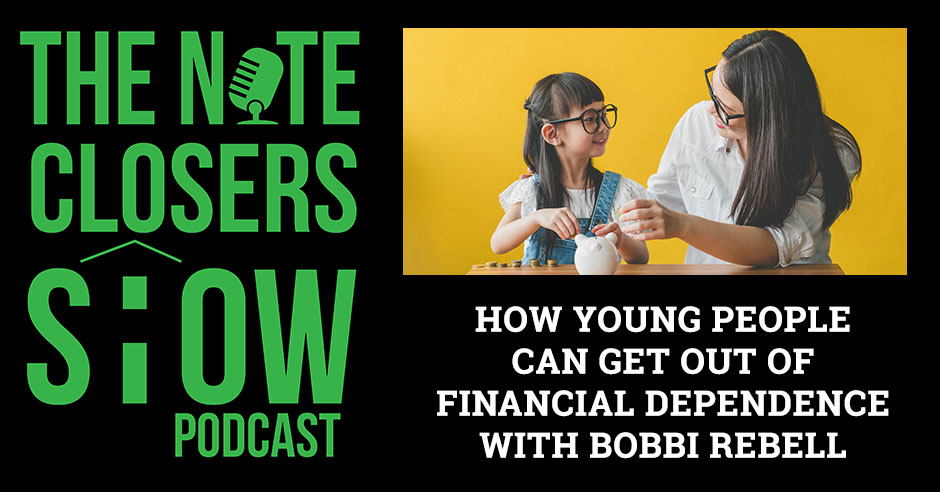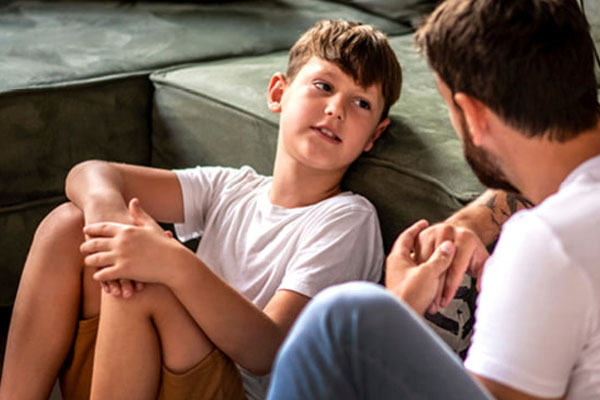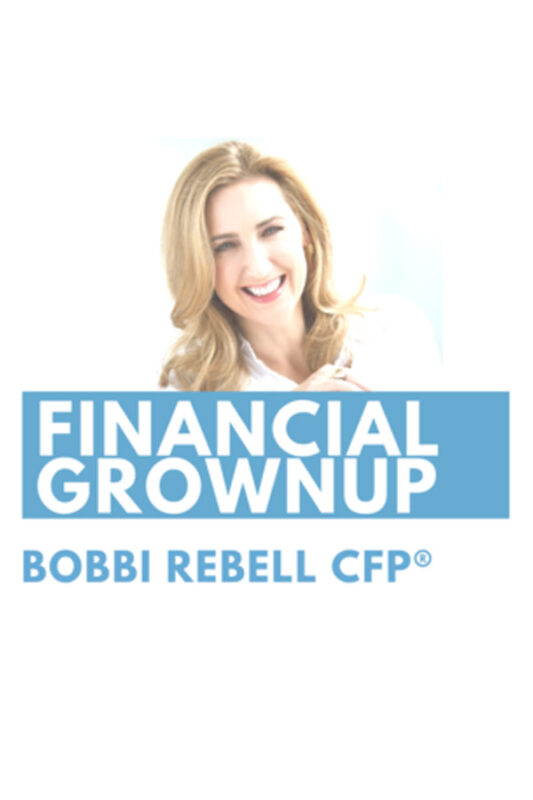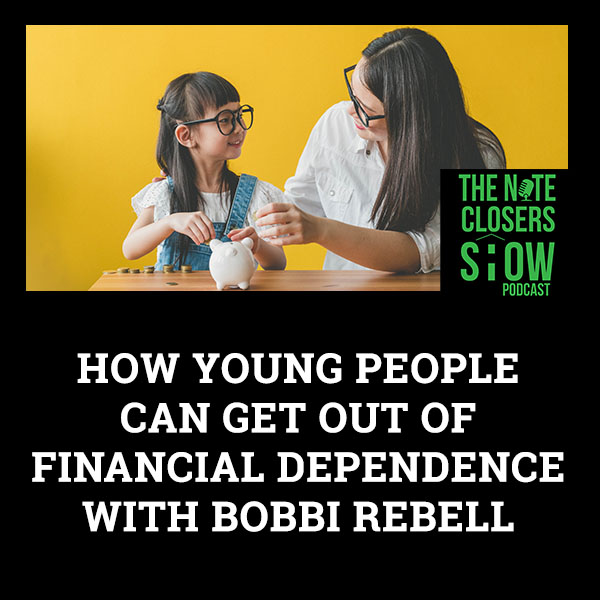
These past few years, the number of young people who are still financially dependent on their parents has been steadily rising. Even though they are off to college or doing side jobs, they continue to be on the payroll of their mothers and fathers. Scott Carson interviews financial expert, journalist, anchor, and CFP Bobbi Rebell about her newest book, Launching Financial Grownups. She presents practical advice for parents on guiding their children to be more confident handling cash. Bobbi explains how letting them make mistakes with money and being transparent with debt are effective motivators in encouraging kids to pursue financial freedom even with their young age.
Want to talk to Scott? Book a call with him HERE.
—
Watch the episode here
Listen to the podcast here
How Young People Can Get Out Of Financial Dependence With Bobbi Rebell
We have a very special guest. It is somebody I met at FinCon and had been following for a while out there. When I saw that she was a keynote speaker at one of the big ideas of FinCon, I was excited. This lady knows her stuff. You’ve probably seen her on so many things, whether it’s Reuters, CNBC, or all over the place. She’s held so many positions. She’s a bestselling author of the book, How to Be a Financial Grownup. She is the host of the badass podcast, Money Tips for Financial Grownups.
She has a new book out that we are excited to have and be a part of and to help get the word out about what she’s doing. This is something that we all need, especially if you got kids or find yourself as an adult child. The book is Launching Financial Grownups: Live Your Richest Life by Helping Your (Almost) Adult Kids Become Everyday Money Smart. We are honored to have the amazing Bobbi Rebell join us here on the show. What is going on, Bobbi? How are you doing?
I am in awe of your intro. You know my background. My background is that I am a TV anchor, and you could have that job. You nailed it. Not a single flub. I don’t think you have a teleprompter, which is good and impressive. That speech at FinCon was hard for me because I am used to having the crutch of a teleprompter. Thank you, and the audience there was so supportive and lovely. It was a little bit scary for me because I am used to having the support of a teleprompter, so I got through the whole thing. Now, I get to the coast and go on shows like yours but you are a pro.
I studied Mass Communication. I wanted to be a news anchor going through college and then ended up going the route of Business and Finance, then got into the note business. I love what your message was. We will get to the book in a while. You said very honest words at FinCon about the need for our tribal leaders. Seth Godin, in the book, Tribes, we need to be a little bit more transparent and share our journey a little bit more.
Things always look so neat and clean on the surface, but the truth is that life is messy, and you can have all these wonderful ideas on paper. This is what inspired my book as I was a Certified Financial Planner, I had been a business news anchor and writing money-related columns for my whole career, and yet my almost adult children were not listening to a word I had to say when it came to investing in a Roth IRA. It was a big fight. I was like, “What is wrong here? I know everything. I’m telling them to do the things, and then the things are not being done.”
The truth is that humans are complicated, and the book is filled with expert advice because I am ultimately a journalist. I’m the conduit to bring everyone advice, and I’m learning along with everyone, and I share my experiences. We’ve even got financial therapists in there. It’s not easy. Hopefully, my book will help lots of people. It helped me. I did a lot of homework to get the book together, and so far, the kids are doing a lot better, having written the book and learned from all the experts. I needed the help, and then the book was the cover for that.
You write the book that helps you, and it ends up helping your audience in a lot of ways.
We are hoping for that but it certainly helps my almost adult children. One of them, spoiler alert, did successfully buy the apartment that she was saving for while the book was being written. She had lived at home and was banking everything. We did supervise. I had access to her bank account and saw the money going in. There were moments but she did save.
She spent two years spending very little money. She did an episode of my podcast where she does talk about the details of it but she did miss some things with her friends. I had mixed feelings when I heard that. I had this pain like, “That stinks that she did miss that night out or she did join them late,” and whatever. She’s happy and proud to be a homeowner. She bought it when she was 24 and loved it.
That’s such a smart activity to be looking at your numbers. As adults or grownup children, in a lot of cases, for a lot of us that have a child there, we always wish we had gone back and done things right. I had a guy I was talking with who was 21, a brand-new investor, and I’m double his age. I was like, “I wish I got started when I was 21 versus doing it when I was being a bartender and living the life. I wish we could go back.”
I’m going to ask your opinion and what you feel about this but we like to ask questions of our audience. We are like, “What are you doing? Do you have a Roth IRA or are you saving?” Overwhelmingly, most of the time, over 50% or 60% are like, “No, I don’t have one. I’m not saving anything for retirement.” That’s downright depressing in a lot of cases, isn’t it?
I don’t want to characterize anyone. I would say now is the day you are going to start opening those accounts, whatever is available to you. Depending on what you are doing, different things are available. If you are not in a corporate job with a 401k, you are not going to have a 401k. If you don’t have the qualifications, meaning income, and the right level of income tax bracket for the Roth IRA, you can’t do that but everyone can invest.
Let’s say my 22-year-old puts in $6,000. He doesn’t have to be done. This is the most important thing for young people. You don’t have to be done. You have no dependence. In theory, you will never have more money to put away and gift to yourself. That’s what you are doing. Treat yourself to the gift of investing in a plain old brokerage fund. You don’t have to put everything into retirement, and that’s not a bad idea because then you have access to that money. Maybe it is for a dream vacation when you are 25 that you started saving for it when you were 22, a down payment on a home or having a car without a big note on it.

Financial Dependence: Treat yourself to the gift of investing in just a plain old brokerage fund. You don’t have to put everything into retirement.
The average car payment is over $700 a month now or something like that. That’s a mortgage payment. That’s the mortgage on my first house. It’s a depreciating asset as well too.
Although not always. It has been quirky. That part has gotten weird but the other thing that worries me with respect to cars is that also the length of the timeline of a car loan has also been extended. I had a 5-year car loan when we first got our 11-year-old Ford Explorer but I hear the timeline is extending to sometimes seven years for that loan, which is long.
With your background and history as a CFP as well, and then writing this book, what was probably the number one surprising thing you got writing it? Was there a nugget, a-ha moment or a light bulb that went off in communicating with your kids? What was the biggest learning experience for you?
The biggest a-ha moment in writing was I put the age parameters at 16 to 26 because that’s usually when you might have your first on-the-books job. You might be getting a car in that age range where you have to worry about the insurance and those expenses. At 26, you come off your parents’ insurance, maybe.
A lot of my friends came to me and said, “My kid is 28, 29, 30 or 35 and still financially tied to me.” I was shocked that 26 wasn’t necessarily the maximum because a generation ago, very often, the max was 18 or 22. It was a life milestone like going to college, graduating high school, graduating college, first job, getting married or whatever it may be.
Now, that’s all out the window. There seem to be no boundaries to when children and adults get off the parents’ payroll, and what was shocking is the number of people that came to me and said, “I don’t know what to do. No one knows this but my kid is living at home,” and they are embarrassed. No one is talking about it but it’s happening or they are not living at home but they are being subsidized.
We saw a little bit of that back in the last recession when people were losing their houses, they moved back in with mom and dad for a little bit.
It’s a different situation. Those are external factors. That’s not what I’m talking about. The family should be there for the family. I’m talking about unnecessary financial dependence.
What do you think has caused that? We are talking about games, people not going out, and getting those jobs as early as possible. What’s the vaccination to solve that?
I don’t know about that but there are big societal things that are happening that have changed the way that parents and children relate and have changed the expectations, not only of parents and children and families but of society. For example, let’s talk about the Affordable Care Act or Obamacare. It usually makes the most financial sense, frankly, for children to stay on their parent’s health plans until they are 26.
What does this do? It creates a financial tie, “I’m already paying for the health insurance. Maybe I will also keep their phone bill going.” We have things that we didn’t have a generation to go like cell phone bills where they are on a family plan. You have to proactively pull them off. You are all sharing a Netflix account. Why would you do that? I’m very much against having double bills. If it’s completely legal to have everybody on the same Netflix account, do it.
You also have given permission effectively to many corporations to not give young adults benefits or to keep them in a gig economy state, or given the young adults permission to doddle and dip their toe into different careers and put together this hodgepodge of side hustles. There are some benefits to that because there are a lot of people that were miserable being shoved into the career because they had to get the benefits and support themselves.
It’s not a cut-and-dry situation but the reality is that because so many young people are in the gig economy and stay financially dependent on their parents, there isn’t that marker that there used to be. Again, this is something that has some good to it. There’s a lot less shame in it. We also have parents that want their children to stay in the same lifestyle that the parents are at. In other words, if you are living in a certain level home, you want your children to not be in a dump, so they are subsidizing them.
Parents resort to subsidizing their children so they can stay in the same lifestyle as them. However, this only makes it hard for kids to keep up financially. Share on XIn many cases, the children would be okay living at the age and income-appropriate level. The parents are propping them up, and then they are surprised when the kids can’t keep up. We have this expectation that the kids live the life of a 50-year-old parent when they are 25, and that’s not fair to the kids. A lot of my book, I hate to say it, is talking to the parents about being more confident in their children that they can make it because very often, parents are offering support that wasn’t asked for.
It’s almost like throwing your kid in the deep end and saying, “You will swim. Let’s throw you in the deep end there a little bit, and if you drown, we will throw a life raft. Let’s get you in there and get you swimming on your own.”
It’s amazing to me, and I’m seeing this in my own life. For example, my stepson is a senior in college, and he’s studying Film and TV. He came to my husband and I and said, “I need X dollars to complete my film for school.” It was a range of $5 to $10 or whatever. We said, “Okay.” We looked at each other because my husband was good, so we knew. We said, “What’s your plan? How can we help you with your plan?” In other words, we could have written a check. We didn’t want to but we could have stretched and done it but what good does that do? He is not going to respect the budget.
He went on GoFundMe and set up a page. He did a video with his other two producers, and we did contribute to his GoFundMe page. We guided him and said, “You should hit up these relatives. Maybe you want to hit up these friends who you have worked for in the last few years that might be a mentor that might want to contribute. You can also put it out there to random people. What can you do?”
He only raised half the money , which was great because he had to work and make that film within that budget and did an amazing job. He raised the money himself. We are so proud of him. He learned that if you don’t have the budget, you adjust to the budget. It was a great lesson. He’s terrific and doing great. He had a feeling of accomplishment that he had raised that money. Not took a check from his parents.
We are capable of so much more than what we think we are. If we get out there and stretch a little higher and do a few things. We don’t need everything to be big. We can do a whole lot with a lot less a lot of times than what we think might.
Our kids are good. If you raise them well, let them accomplish things. Let them know that you have confidence in them but you are there for them. You are the backstop. If something bad happens, you will be there for them. Let them know that but also give them the confidence to know they are going to be okay and can accomplish things on their own, and you are very confident in them. That’s important because something could happen, and you won’t be there for them but you know that they are okay.
Let your kids accomplish things. Let them know that you have confidence in them. You won't always be there for them, so they must be confident enough about whatever may happen. Share on XWhat about tough love? How does that come into the picture sometimes?
It depends on the kid. I am generally not a big believer in tough love. I am a believer in letting your kid know that you believe in them, and that’s very different from tough love. I don’t believe in cutting a kid off at an arbitrary age. I know that some people do. If that works for you and your kid and that’s right for you, go for it.
The world is a tough place. If you know someone and you have a connection and can help your kid get a job, call that connection. Help them. It’s hard but make sure that they do the follow-up and emails. Look at their emails or help them write the emails but don’t write it for them and say, “I’m happy to take a look at it. I’m happy to give you some feedback.” You could nudge them and say, “Did you follow up with them?” Don’t do the follow-up yourself. There’s nothing wrong with being helpful in the background and letting them know that they can come to you.
My little boy is in ninth grade. He texted me that he was confused. He was getting a refund on something he had bought. He has money that I give him through an app. He had bought a poster that was being sent to our house. He didn’t understand why it was being refunded and how it was going to come back to this app or what was going to happen. He had not informed me that he was buying this and he didn’t have to. It was in the zone that he didn’t do anything wrong but I love that he came to me.
I was able to look at it and say, “You didn’t write our address correctly.” There was communication there and I said, “From now on, why don’t you have me check things? You can buy what you want with the allowance that you’ve earned but let mom check it for you.” Now, he understands. It’s because we let him fail a little. He will now come to us. We will let him do his thing but it’s okay to have the second pair of eyes on it. You are there to teach your kids not to throw them to the wolves.
It’s also probably a little different mindset versus, “Let me check,” although I got it. You let him fail and realize the value.
I let him fail. I let him put the address in incorrectly, and it’s fine. He didn’t get his poster or whatever it was that he ordered or maybe it was a T-shirt. It didn’t come, and he got a refund because they couldn’t mail it because there was an incomplete address. Now, he knows.
It’s corrected, and he won’t make the same mistake again.
I did not judge him. I said, “Let me take a look at it. It looks like you didn’t put the complete address. How about next time, if you want to buy something, show me so I can double-check it for you.”
As kids are getting older and graduating high school or pre-graduation, getting ready to go out in the world and go to college, what are some of your favorite tips or recommendations for parents to help them start on that financial pathway on a good foot or a good trajectory?
I would let them do as much paperwork as possible with your supervision. I hate to say this, and I don’t know how to put it more basic but they have to press the keys on their own keyboard. Even my son that graduated college paid his rent, and I reimbursed him. We covered his rent but I don’t know what went on with the landlord. That’s with him.
He’s got to pay his rent on time, and he’s got to submit receipts to me. I will reimburse him but he is the one that has to make sure he pays on time, gets his security deposit back, and pays his renter’s insurance. I will be checking on him but it’s on him. The actual payments have to happen through the kid. That’s important. Even with tuition, he had the account.
Keeping them close to the numbers and making them aware of the actual tuition is important. He was in New York, so it was pretty pricey. He had to submit receipts to us for reimbursement, and then we would then decide what to reimburse. We reimburse most of it because he’s a good kid. He wasn’t spending silly money. When you have a debit card, and you are going against your parents’ money, maybe you don’t feel it as much but when it’s your money and then you have to make the spreadsheet and submit it for reimbursement, which is also what you are going to do as an employee potentially, you see the numbers and feel it. It’s a little more tangible to you.
You don't feel the financial impact when you are just going against your parents' money. But if you are spending your money, seeing the numbers becomes more tangible. Share on XThat totally makes sense of getting into that process, doing it, and act like you would as an adult out there to get things reimbursed and expense reports and stuff like that. It’s very important.
The same thing with our taxes. He had income because he had a job. Keep him close to the taxes and let them see the form.
Are there any mistakes that you see parents making that you would say, “Let’s not go that route?” Maybe have them as a co-signer or a credit card or give them a credit card to handle. Faux pas that you don’t think will work out well.
Assuming when a child says they get it, that they do, sometimes they don’t. An example I talk about in the book is my stepdaughter, who’s amazing, the one that bought an apartment at age 24. When it came time to set up the 401K for her first job, she set it up but she hadn’t put money into investments. I said to her, “Are you all set with your 401k?” “Yes, bye. I’m going out with my friends.” “Let me look.” She had not chosen the investments, so we did that, and we are good but don’t assume because they say they understand something that they do. Ask them to explain it back, to see the page that they did set it up correctly, and didn’t maybe, for example, pick a mutual fund to invest in their 401k that was not the right one for them.

Financial Dependence: Don’t just assume your children understand something because they say so. Ask them to explain it back to you to see if they truly got the idea correctly.
Check up on them and create that open dialogue but be careful not to be judgmental. Don’t always believe them when they say they got it. They will sometimes say that because they are rushing out to go with their friends or don’t want to hear it. “Did you sign up for your commuter benefits? Let me see. Let’s double-check that everything is done correctly,” especially when it comes to things that are only once a year.
For example, if they are in the business of having a flexible spending account, although most kids now have HSAs. Let’s say they have an FSA and it’s using it or losing it, and you got to do it right for the year, and you are done for the year. Please check it. Make sure they did it. They might have misunderstood what you said, were confused or thought it was something else. Almost every time a kid doesn’t understand something or says they understand and don’t, it is well-intentioned but it happens a lot, so check.
That doesn’t always happen with kids, though too. It happens with a lot of adults.
Check on anyone that you care about because we all have our moments. We all have our moments where we are forgetful or we don’t check the right box or something happens, and it doesn’t process. Even with the general benefits once a year with my family, you have to make sure you get the receipt and keep that receipt because things go wrong. You want to make sure that you have it or you signed up for the health insurance correctly, or whatever it may be, because there are very serious consequences if you don’t fill out those annual enrollment benefits properly. Let’s not even talk about Medicare. That’s not your audience yet, but Medicare is funky.
I tried to sit down with my mom to go through it a while back, and I was like, “Let’s get a professional here to help us out with that versus trying to wing it here.” I have to ask this because of your expertise and experience. The whole aspect of when you are in real estate and a friend goes and buys a house, and you are a realtor. They are going to ask your opinion about something. Is there something in the finance that friends and people do that you are like, “Why didn’t you pick up the phone and call me on that?” Besides checking the 401(k) or stuff like that, what’s the thing that stands out to you that’s a pet peeve?
Peer pressure is something that is very complicated and still lives with us as adults. Sometimes people will buy things to impress other people that they don’t even like. There’s that saying. I get frustrated when people I see don’t have the money or maybe they do have the money, but I think people live beyond their means sometimes. I feel bad because it comes from being well-intentioned and having very human insecurities and a desire to be liked and to be accepted into the group.

Financial Dependence: Some people are willing to buy things they don’t even like to impress others, pushing them to live beyond their means.
One thing that I’ve urged my stepdaughter to do that I try to practice as well. If you are going out with a group, try to be in charge of the restaurant and pick the restaurant that’s the price point for the person with the least amount of money to make everyone comfortable. I hate it when people will go with a restaurant and choose a restaurant that may be their favorite, a restaurant they’ve always aspired to go to or maybe it’s a restaurant they think will impress their friends if they say, “Let’s go to this cool trendy restaurant that’s ridiculously expensive because I hang out there.” That’s not doing anyone a favor.
Throughout my career, I’ve met some extremely wealthy people, and part of the way to stay there for many of them is to not spend extravagantly. I have friends that are very wealthy, and you would not know it because they will dress neatly and nicely. They will drive a perfectly nice car but are not flashy and don’t need to go to the most expensive restaurant in town and order extremely expensive drinks and all the things to prove their worth.
It’s usually people that are insecure or maybe want to impress you that do that. It’s not a sign of being wealthy to overspend on things like meals, etc. I feel bad for those people making poor financial choices and the people that don’t have the money and want to be included, and then maybe get pressured into going to that restaurant with the people that maybe can afford it. They are stuck paying their share of the bill. It’s uncomfortable, and I hate to see that.
Trying to be impressive doesn’t pay the bills in the long run.
No, it doesn’t, but it’s human nature. My husband and I were watching a movie called The Joneses. It has Demi Moore in it and the guy from the X-Files.
It’s David Duchovny.
It really says it all. It’s such a statement movie. It’s a marketing firm that created a fake family. They moved into a neighborhood and basically were the original influencers. They come in, and they are playing golf and tennis. They are going to the country club, showing these almost wealthy people things that are aspirational, and trying to get them to buy things, and it’s very sad. It ruins a lot of lives because it creates this feeling of trying to keep up with the Joneses, and they are overspending.
It was interesting there where they are getting people to buy cars. They were getting bonuses on getting their neighbors and pseudo friends to buy new stuff, product, and tracking. It’s an interesting movie. I was thinking that exactly as you were talking about that. It’s funny that you brought that up. You talk about doing so much and getting the kids off on their right foot or helping them get a breakaway from their helicopter parents, what do you hope for with the book? What’s your biggest striving goal with it is to get the word out more in helping people with the tips and tools that you’ve developed over time? There’s got to be a why there a little bit more. Can you dive into that?
My hope was for people to come out of the shadows and start talking about it because people did start coming out to me and telling me, as I said, “My child, who is this age is still financially tied to me. I’m still paying part of their rent, and they now have children.” Some politician who was being investigated were having trouble investigating him because they wanted the phone records but he was on his parents’ phone plan and he was 36. It was crazy.
I want people to take the shame out of it and be honest that we, as parents, are so well-intentioned. The extension of helicopter parenting is that we are becoming concierge parents because of technology. For me, I did not have texting growing up. We did not have cell phones. We had car phones for the new thing when I was a child. Now, we are available and reachable at all times.
As I said, my ninth grader is texting me about this purchase and the error that he made. We are available at all times to solve their problems, often with money, because money is an easy way to solve your child’s problem in many cases. We are doing it because it makes sense in the short-term but the long-term consequences are real.
My hope is that we create a dialogue so that we, as parents, can help each other to take a step back and say, “We are good parents. Our kids know what they are doing. We need to give them the space to be financial grownups. Let them know we are there for them. Keep the doors of communication open. Be there to help but in the right ways, not in a way that undermines their ability to be adults.”
Kids must be given enough space to become financial grownups. Parents must keep the doors of communication open but not in a way that undermines their ability to be adults. Share on XThe book is Launching Financial Grownups. You need to get grab a copy of it and give it to your friends with Christmas around the band here in a few months. Grab a copy of it and put it in a sock and stuff. I want to do a little pivot here. Let’s talk about your podcast. You have it going for a while. What’s your biggest win or takeaway from having your podcast?
My favorite episode is the episode that you are on. My second favorite episode is the one with Ashley, my stepdaughter, because people are so fascinated with her story of how did a 24-year-old save up, and it was a six-figure sum to buy an apartment. She talks about it and talks very honestly. She knows she’s privileged that she didn’t have student debt so that’s a big one.
She was also able to live at home, rent-free, that’s another big one, and COVID happened. She had a boyfriend, so she wasn’t out-dating. COVID happened so she didn’t have a lot of pressure to go out with her friends and spend money. Those are real things that might have taken longer if it weren’t for COVID, rates were very low still, and that also helped. She had planned this so far in advance. She had worked very deliberately on her credit score. She understood how much that would matter to being qualified because New York City real estate is complicated.
She’s in a condop, which is a co-op with condo rules. We did that very specifically with her because she may want to go to graduate school for a couple of years, and when you are at a condop in New York City, you can rent the apartment out. We wanted that flexibility for her. For some co-ops, you cannot rent them out. New York City real estate is a whole different world. It’s very complicated. I love that episode.
We are focusing more as we get to the second half of 2022 because the stock market has become such a source of concern for so many people. We are focusing a lot on investing and different ways to invest. That’s part of the reason that I recruited you to come to the show. We are going to be focusing more in the fall of 2022 and probably into 2023, much more on investing for financial grownups.
I love it because financial grownups are important for us to grow up at some point, as we need to. I have a question for you. If you’ve got kids and haven’t saved for retirement, what’s your opinion on, “Do I need to put money away for retirement or do I even pay for my kid’s education?”
It’s retirement.
What’s your thought about the college-debt Forgiveness Act or the tuition forgiveness stuff that’s going on out there?
It’s complicated. I don’t want to get political. I wish everyone well. That’s what I want to say. As a parent, tuition is too high. I feel for people that are mired in debt. Many times, they are sold a bill of goods that is not fair to them, so I feel for them but at the same time, there are people that have paid off their debt. It’s complicated, and I send everyone love and wish everyone well.
There’s a whole lot of gray area there. There are rights and wrongs on different sides of the ball out there.
I would like to focus on the bloated administrations of our universities and the waste going on there and more accountability for our universities, having paid two full college tuition with no financial aid. The tuition number is too high, and it is un-American to expect anyone to pay those numbers. I don’t think it’s right. I would rather the discussion veer towards accountability for these educational institutions at all levels. It is not right to be charging students or parents this amount of money. It’s not right. I hope the discussion goes away from debt and avoiding debt. It’s not insanity. I don’t know how anyone should be expected to pay this tuition.
I put myself through school for a Business degree. I did have some scholarships early on and grants but in the last couple of years, I paid my way through and then even went to graduate school and stuff like that too. I get it. There are both sides. I can see the good for some folks, and I can see, “Come on. I paid it off. Why am I not getting a handout? Can I get a refund?”
Someone said to us, “Why didn’t you throw debt onto your kids because you would’ve got it paid off?” I want the discussion to go toward these institutions so that no one has this debt in the first place. I don’t think it’s right to put this tremendous burden on young Americans and their parents.
No true words are spoken out there, Bobbi. Guys and gals, as I said, the book is Launching Financial Grownups. Get you a copy and check it out. Give it to your kids or grandkids. It’s a great book out there, and then check out Bobbi’s podcast as well, it’s Money Tips for Financial Grownups. Also, don’t forget to check out her first book, How to Be a Financial Grownup. Bobbi, thank you so much for coming to the Note Closer Show. It has been an absolute joy to have you.

Launching Financial Grownups: Live Your Richest Life by Helping Your (Almost) Adult Kids Become Everyday Money Smart
Thank you so much for having me. Thank you for being on my Money Tips for Financial Grown Ups podcast as well. Everyone should please check out that episode. You are wonderful, and you gave me so many incredible investing tips. That was a new favorite episode for me.
I appreciate it. What’s the best way for folks to reach out to you for the podcast or the book?
My website is my name, BobbiRebell.com. Also, if you are looking for gifts in addition to the book, a nice stocking stuffer is to go to GrownupGear.com, where I have lots of fun merch to show up your grownup side. There are lots of good stuff there. I got adorable baby gifts there.
It’s hard to believe that you are the grownup of this relationship.
We have a bib that says, “I can’t believe you are the grownup.” It’s in a onesie also for babies. It’s cute stuff. It’s a fun stocking stuffer for the holidays.
Bobbi, thanks again. Have a great day.
Thanks for having me.
You are welcome. Make sure you take advantage of the tools and the tips that Bobbi discussed and what she covers in her book there. If you’ve got kids, grandkids or somebody that’s struggling with that aspect of wanting to help their kids take that next step or grow up and what we all want to be, check out the book, and we will see you all at the top, everybody. Bye.
Important Links
- How to Be a Financial Grownup
- Money Tips for Financial Grownups
- Launching Financial Grownups: Live Your Richest Life by Helping Your (Almost) Adult Kids Become Everyday Money Smart
- Tribes
- Money Tips for Financial Grown Ups – Past Episode
- Ashley Kaufman – Money Tips for Financial Grownups Past Episode
- BobbiRebell.com
- GrownupGear.com
- https://www.FinancialGrownup.com/
About Bobbi Rebell
 Bobbi Rebell is a certified financial planner and author of two books about money and adulting- the recently released Launching Financial Grownups – which helps parents give kids the competence and the confidence to take charge of their finances- and How to be a financial grownup which is for those almost adults to get them on the path to success. She also hosts the money tips for financial grownups podcast- on which i was recently a guest- and has a super fun merch store called Grownupgear. And by the way Bobbi was for years a business tv anchor and personal finance columnist – working at places ranging from CNBC to CNN to Reuters.
Bobbi Rebell is a certified financial planner and author of two books about money and adulting- the recently released Launching Financial Grownups – which helps parents give kids the competence and the confidence to take charge of their finances- and How to be a financial grownup which is for those almost adults to get them on the path to success. She also hosts the money tips for financial grownups podcast- on which i was recently a guest- and has a super fun merch store called Grownupgear. And by the way Bobbi was for years a business tv anchor and personal finance columnist – working at places ranging from CNBC to CNN to Reuters.
Want to talk to Scott? Book a call with him HERE
Love the show? Subscribe, rate, review, and share!

